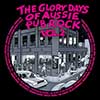 Another 90 Oz Rock songs for 20 bucks. Can’t go wrong, eh?
Another 90 Oz Rock songs for 20 bucks. Can’t go wrong, eh?
This is Festival’s second “Glory Days” offering and it’s inevitably subject to some “mainstreaming”. There’s more chart action and a sprinkling of what might be regarded as lesser-known tracks or rarities, although you could argue they’re skewed from a Melbourne perspective. It's the lesser-known cuts that make this collection tolerable.
How do you even come up with 180 songs across two volumes and eight CDs to represent a time when Australian pub rock was a staple diet for most of the population aged under 25? Me, I’d cut up some old 2SM Top 40s, toss ‘em up in the air and see what came down.
Fortunately, compiler David Laing has taken a bit more care and Volume 2 treads a path somewhere between obvious and relatively obscure. That doesn’t shut out the likes of Barnesy, although Farnsey is thankfully nowhere to be heard, and dross like the overstated Boom Crash Opera and the execrable Mother Goose make the grade.
You, me and the tender young things who may be growing up around us don’t need to hear Men At Work’s “Be Good Johnny” in this or any another world. “The Boys Light Up” should have been put on the bonfire at that party we all went to in the early ‘80s. No amount of cold gold KB can make Aussie Crawl listenable, even if you're one of the beautiful people with hopes up for trousers down on a business flight. See? I was scarred.
You can make a solid case for stuff like Mike Rudd & The Heaters (“Talking to the Television”), The Breakers (“When I'm On TV”) and The Boys (“Weoh Weoh Weoh”) to get a guernsey and they have. Broderick Smith might have had one of Melbourne’s best voices even if the material he sang in Big Combo let him down. Some of the tracks have that horrible ‘80s production that should never be inflicted on human ears.
On the plus side, The Numbers, Hitmen, The Church and The Sports all stand up to be counted. There’s only one act among that lot that achieved any substantial overseas success and their inclusion makes you wonder what could have been, had the cards been dealt another way.
Again, we’re reminded that many of the divisions between genres of this era music were more geographical than stylistic. These bands, and their songs, were very much a product of a very different time in a very different music industry.




